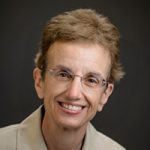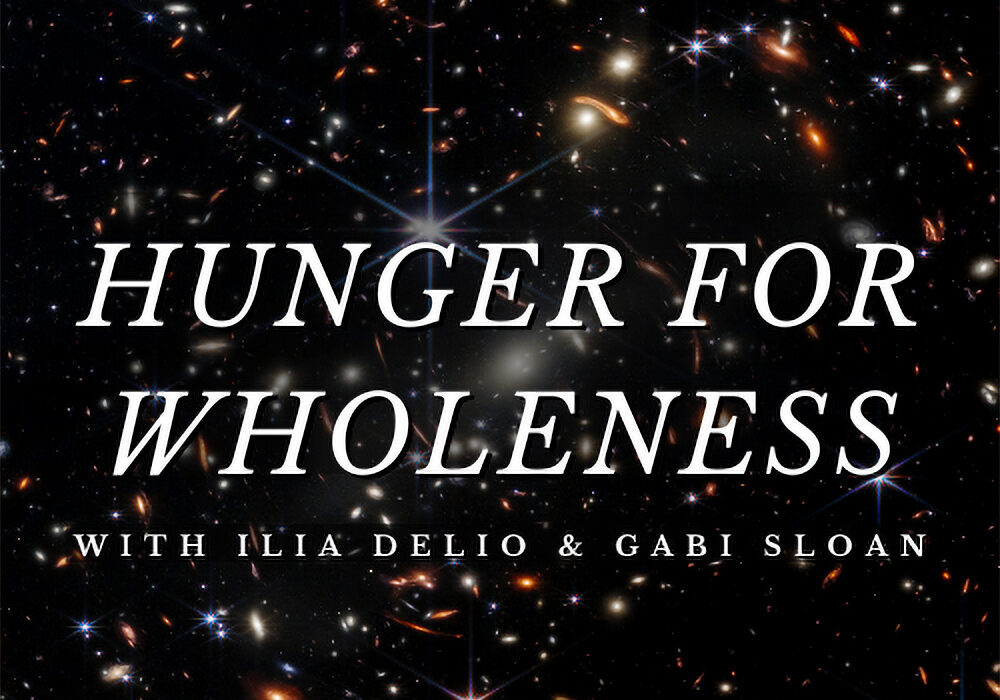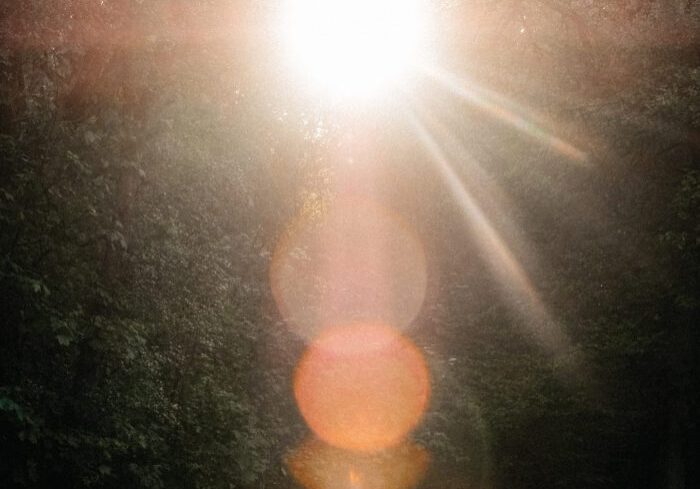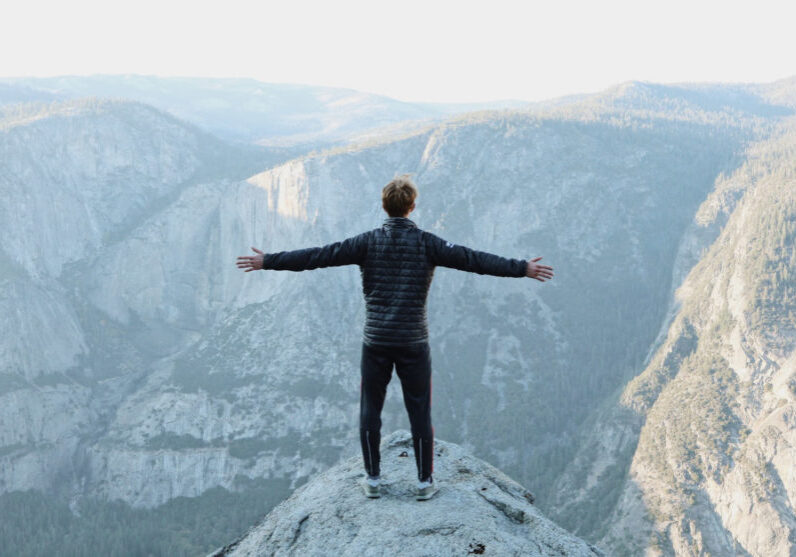Church of the Planet
Q: Throughout Scripture its always a remnant which, by grace, “get” what God is up to in any given era. Jesus called them his “little flock” or “the elect.” How, then, does that biblical pattern square with Teilhard’s vision of a large-scale super-humanized collective evolving along planetary lines? Given the natural resistances in human souls for same, seems that a “grace booster” (a mass awakening) along unprecedented global lines would have to occur in order to move that along.”
 Ilia: Last Friday, the Omega Center sponsored a Zoom conference on “The Sacrament of Everyday Life.” Over eight hundred people from around the world joined in for this conversation, thanks to the genius of Zoom technology. I want to build on this gathering and at the same time address a question that was submitted two weeks ago, namely, who is the “elect” in a Big Bang universe, the little flock that Jesus refers to in Luke 12:32. My short answer is, everyone who helps evolve the universe by deepening love, uniting in peace, forgiving in compassion, and sacrificing for the sake of the whole, is part of this little flock. The member of the little flock is the evolver alive with love-energy, the sacramental participant of evolution. Such participation is not tribal but global; not a matter of one religion or another , but a consciousness of being bound to an ultimate whole which is Love itself.
Ilia: Last Friday, the Omega Center sponsored a Zoom conference on “The Sacrament of Everyday Life.” Over eight hundred people from around the world joined in for this conversation, thanks to the genius of Zoom technology. I want to build on this gathering and at the same time address a question that was submitted two weeks ago, namely, who is the “elect” in a Big Bang universe, the little flock that Jesus refers to in Luke 12:32. My short answer is, everyone who helps evolve the universe by deepening love, uniting in peace, forgiving in compassion, and sacrificing for the sake of the whole, is part of this little flock. The member of the little flock is the evolver alive with love-energy, the sacramental participant of evolution. Such participation is not tribal but global; not a matter of one religion or another , but a consciousness of being bound to an ultimate whole which is Love itself.
The great religion scholar Mircea Eliade wrote eloquently on myth as story and ritual that conveys deep truths of existence through narrative, symbol and metaphor. Religion is mythic. It tells a story that imparts deep meaning to life and we enact this meaning through ritual and worship. As we move from first axial consciousness, the level of consciousness in which world religions arose, into second axial consciousness, our period of globalization and ecology, we will need new stories and rituals to vitalize our lives. Religion is in evolution and the “little flock” are those who will engage in the new Church of the planet. Such engagement depends on how we understand God in evolution and how we see the role of the Church. Teilhard thought widely on each topic.
Teilhard was a mystic and a scientist. For him, science is “a process, always probing into the unknown.” So too is mysticism. Science like mysticism is not “contemplating a truth already established”; rather “it is the very act of discovery that create[s] a new truth.” “It is in these terms,” Ursula King writes, “that we must understand Teilhard’s talk of loving God … ‘with every fiber of the unifying universe.’ ” “As scientists struggle to make sense of their findings,” King writes, they are grasping for a new unity, new horizons of insight. “The ‘fibers of the unifying universe’ come together in the scientist’s mind,” King writes, as the mind is drawn to a power hidden in matter; for Teilhard this is “dark adoration.” It is “the supreme spiritual act by which the dust-cloud of experience takes on form and is kindled at the fire of knowledge” (Teilhard, Activation of Energy). Teilhard indicates that grappling with matter leads to “troubled worship.” Entering the unknown dynamics of matter disturbs the known, including prayer and worship. It is not business as usual, for new knowledge leads to new insights, which leads to new visions and understandings, and in this respect, God continues to emerge in new ways.
For Teilhard, matter is the incarnating presence of divinity; God is present in matter and not merely to matter. This core belief is still foreign to many ears because God’s immutability seems to be compromised. But divine immutability was based on ancient Greek ideas on matter and form, ideas that have radically changed with modern science. Teilhard is clear that God and matter are not the same: God is not matter but God is not apart from matter either. Rather, the preposition “in” is key: God is in matter meaning that God is the ultimate horizon, the depth and breadth of matter, other than matter (transcendent) yet intimately present to matter (immanent). To use Paul Tillich’s idea, God is the ultimacy of matter. When everything can be said about a particular form of matter, for example, a leaf (green, veined, and all its other properties), we have not exhausted that which really draws us to it, such as its beauty or light. The ultimacy of this experience, which cannot be adequately spoken or described, is God.
So when Teilhard speaks of a power in matter, he is speaking of the ultimate power that eludes our ability to grasp or measure it. Yet it is a power that is deeply experienced and draws us into it, expressed in the many ways humans invent, create and transcend themselves. Science, technology, art, music, study, writing, all are forms of engaging this divine power in matter by which we transcend ourselves.
Unless we grapple with matter — not only in scientific research but all aspects of world-unfolding life — we are missing out on the power of life itself, namely, God.
People today are searching for something to believe in, a power that vitalizes and dynamizes life. If the God of Jesus Christ “fills all things,” as St. Paul writes, then God must be found in all things. To belong to the Church is to belong to those committed to finding God in all things. If religion is the core energy of evolution and Christ, divine love in matter, is the unifying power within and ahead of the dynamic evolutionary process; Christianity then must be a planetary faith not a political establishment. Teilhard deconstructed institutional and patriarchal Christianity and reframed the incarnation as normative of evolution, not religion. This was a radical and bold move and deeply prophetic. He spoke of the Church as a new phylum in evolution and posited a new christified species. His theistic evolution, grounded in the dynamism of God’s becoming, returns us to the root of the incarnation and the question of Jesus: “Who do you say that I am?” Similar to the Hindu Namaste, the God in me recognizes the God in you. Christ is the entanglement of our lives in the ever-newness of God’s creative love.
Teilhard had consummate trust in the presence of God’s absolute love. HIs advice is to surrender to God here and now, in every aspect of our lives. He spoke of God as “personal Love and cosmic Power … .God who is eternal Being-in-itself is, one might say, everywhere in process of formation for us. God is the heart of everything.” God is rising up in the world in and through us. The fullness of God’s life, therefore, depends on our participation. Our choices affect not only the world but God’s life as well.
We are encouraged to fall in love with Love itself, to dream a God who not only loves us but relies on us to move this creation to greater wholeness. God’s love should impel and encourage us to not be afraid; to dare to dream and share with God our thoughts and gifts; to use for the good of the whole. This thought should give us much hope, but also, at the same time, it should awaken us to the responsibility that we take on as co-creators with God. We share in the responsibility of bringing God’s creation towards fulfillment and completeness by the way we live, pray and act. The Church of the planet is a global Church and thus we must help one another in this act of co-creation.
In Teilhard’s view, God’s creative power does not fashion us as though out of soft clay; it is a fire that kindles life in whatever it touches, a quickening spirit. He wrote: “We must decisively adapt ourselves to it, model ourselves upon it . . . to increase our creative energy one must deepen thought, dilate the heart, intensify external activity. For created beings must work if they would be yet further created.” (Hymn of the Universe, 118] We have developed a modern mindset of individualism, consuming for our personal selves and our personal families, wondering how we can get back to “normal” so we can resume our individual habits. But the new normal is chaotic, complexified existence. Never before have we needed one another as we do now. It is time to stop criticizing one another and start helping each other see through a new eye of love. Teilhard wrote: “If all those who suffer in the world were to unite their sufferings so that the pain of the world should become on single grand act of consciousness, of sublimation, of unification, would not this be one of the most exalted forms in which the mysterious work of creation could be manifested to our eyes?” [Hymn of the Universe, 94] This means to surrender to the power of love at the heart of the world and “throw ourselves fearlessly into the crucible of the world of tomorrow” [Hymn of the Universe, 95].
We have to reorient our priorities. What do we really want and do we want it together? This is the question of being Church in the world. The idea of a single individual is an illusion and to live an illusory life is to bear the consequences of separation and isolation. Rather, we are to “live with a single passion, the desire to help forward the synthesis of Christ and the universe.” [Hymn of the Universe, 100]
We must have hope in the Church of tomorrow and a desire to be part of its future.
 View print-friendly version
View print-friendly version
19 Comments
Related Posts

Hunger for Wholeness Podcast Launches!
Story matters. Our lives are shaped around immersive, powerful stories that thrive at the heart of our religious traditions, scientific inquiries, and cultural landscapes. All stories – big and small…


Amen to all that Joseph. We definitely need a new language and way of speaking that includes what we know now and how we understand the evolution of all that is.
I don’t think ever talked about a “church.” I think we we have been transformed a Global Church is a misconception. Rather creation itself is the meeting place of the Holy because creation is imbued with the Holy. Churches” as we have known will be no more they are no longer needed and so will the division and at times hostility among churches.
Joseph Weber, I was thinking some of your clearly expressed sentiments and ideas as I read Ilia Delio’s words. Many years ago, in the 60’s, a friend who was nun, forward thinker, theologian and wonderful elderly woman, in one of her lectures on Teilhard de Chardin, used an image that has remained with me, an metaphor for the emerging consciousness we feel, see, hope for. Her image:
a person emerging from a hole in the earth, a “manhole,” As we emerge, we leave behind the way of living down in that “hole.” The structures of the present church, based as they still are on medieval beliefs, are part of that hole. We are coming into better light. The old structures do not merely fail to nourish, they inhibit growth in this emerging consciousness.
Eileen Luny
Joseph I think we are being weaned away from the 7 sacraments, perhaps from clergy, too. Even in parishes there is seldom a sense of being a part of a larger family/clan/tribe. I think we must question some untouchable doctrines we parrot but do not understand or live by.
For me the elephant in the living room is Human Sexuality. In 2000 years the hierarchy has been unable to harmonize/integrate human sexuality with the gospel of Jesus.
.
I also loved the comments above and of course, Ilia’s essay. I am yearning deeply to be part of this movement! I’ve been lamenting much recently about how I wish that this “remnant” would come together to give each other support, motivation and energy. Peace and love to all!
We are the Prime Movers !
Hope in the church of tomorrow, perhaps; hope in today’s catholic Church, hardly…
Both above comments are right on! I just finished re listening to Barbara Marx Hubbard ‘s “Visions of a Universal Humanity “and found the presenters prophetic and Ilia following now leading us to the future .
…we will need new stories and rituals to vitalize our lives.
If the “church” is to survive at cannot continue with the same mode of liturgy, even the current lackluster virtual liturgy which is totally lifeless. As I have read elsewhere, it’s like inviting guests to a Thanksgiving dinner, but they cannot partake of the food prepared, maybe only spiritually… which is just patriarchal imaginative jinglish.
Ilia, I am not exactly sure as to your meaning of church. Is it as it has been in the past and still now clerical centered; or what it must be in the future, totally reorganized and lay centered; hopefully not a very long way down the road?
Unfortunately, many may not be able to be imaginative and see beyond what the norm has been for hundreds of years. Much of the problem is the language currently used, a rehash of archaic patriarchal images that do not point to what we know about life and creation in the present time. It does not speak to the issues we face and struggle within today’s world and yes, even tomorrows world. The current language is just the same-old “pie in the sky” afterlife to be concerned with, nothing about of Jesus speaking of being present in the here and now that matters above all else.
“Church” is also an archaic word that does not offer joy or hope to people. It’s rigid, like bricks the buildings are constructed from, inflexible and hierarchal. Whatever form it takes, it must be always fluid, to and from the culture it evolves out of; and not something imposed from bureaucrats thousands of miles away in institutional offices. Whatever notion or single word to describe what it is to be called, it must be unique, inspiring and expressing welcome to all, not just for card-carrying orthodox individuals.
I don’t believe that Jesus even thought of a notion of “church” as it is experienced today, but instead he meant small communities of followers that gathered to share their stories, their experiences of God/Spirit in Life, through reflecting upon his teachings, breaking bread and sharing it and celebrating Life. Creative gatherings, definitely not being anchored in or guided by institutional theology, rituals, dogmas and doctrines.
These past months, of lockdown due to Covid-19, instead of sharing reasons for liturgy, explaining what it means in new idioms, the current hierarchal church continues to plod on, doing the same old rituals, yet expecting change in people to occur. That’s insane and irresponsible, plain blindness. That’s also not inspiring, motivating or community building. It’s knuckle-dragging thinking that keeps faith communities from intuiting the Spirit working in life through the resurrective process of life’s cycles and the cycles of Earth’s seasons.
Even in the small faith community my wife and I have been active participants in for more than forty years, there are some members who long to get back to liturgy as it has been, even though there will be limitations on the numbers of participants present. Life has changed for each of us. We need to readapt our thinking in new ways and be most creative and tune into the Spirit where it lures us to new horizons of possibilities.
Such hope came to me as I read each word. Energy pulsed. Excitement bubbled. My pen frantically scribbled notes. I was thinking, wondering, “how do I ‘fit'”?. Then a sickening reality hit. All this takes a very different political system as well. All this takes different church hierarchies.
All requires a willingness to understand their EGO and SHADOW
How many will be willing to do that hard, painful work? How many will divest themselves of power so a new social-economic-political structure can be born?Will the planet ever be even ready to birth the midwife(s) of such change?